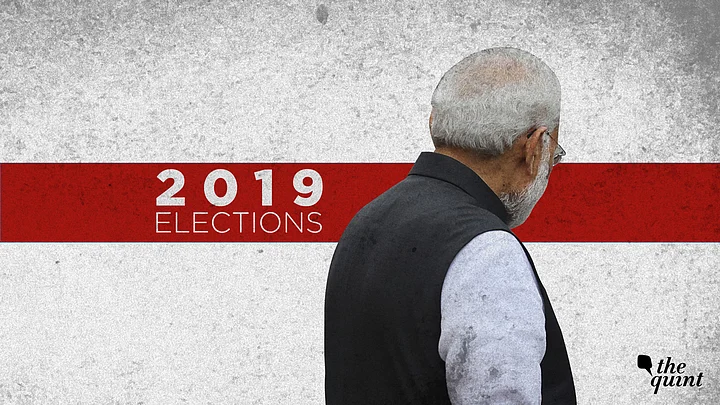With the Congress decisively ahead in Chhattisgarh and Rajasthan, and Madhya Pradesh heading for a photo-finish, the Assembly elections have proven to be disastrous for the Bharatiya Janata Party (BJP). The results are particularly significant if one views them in the context of the Lok Sabha elections, which are due a few months from now.
Remember, the BJP had swept Chhattisgarh, Madhya Pradesh and Rajasthan in the 2014 Lok Sabha elections. It won 62 out of the 65 Lok Sabha constituencies in these three states, leaving Congress with just three seats: two in Madhya Pradesh, one in Chhattisgarh, and zero in Rajasthan.
Each Lok Sabha seat has eight or nine Assembly segments in Chhattisgarh, eight segments in Rajasthan, seven or eight segments in Madhya Pradesh, seven segments in Telangana and 40 segments in Mizoram.
We found that the BJP could end up losing over 30 seats if today’s results are replicated in the Lok Sabha polls. The constituencies of several prominent central ministers could be in danger.
Road To 2019 Elections: Decoding BJP’s Performance
We aggregated the total votes garnered by each party in all the assembly segments in a Lok Sabha constituency to estimate how today's results would translate in terms of Lok Sabha seats.
Let's begin with Chhattisgarh, where the Congress is heading towards an absolute majority after being out of power for the last 15 years. In 2014, the BJP had won 10 out of 11 Lok Sabha seats. The Congress managed to win only from Durg. If today's trends are repeated in the Lok Sabha elections, the tally could be reversed. The Congress is decisively ahead in 10 Lok Sabha seats.
The BJP was behind even in Raigarh, the constituency of Vishnu Deo Sai, Chhattisgarh's sole representative in the Narendra Modi government. He is the minister of state for steel. The only Lok Sabha seat where the BJP fared relatively well is Bilaspur, a seat which BJP hasn't lost since 1996.
The BJP had swept Rajasthan in the 2014 Lok Sabha elections, winning all 25 seats in the state. However, it is unlikely to repeat this feat as Congress is decisively ahead in 13 Lok Sabha seats. The BJP was even trailing in Jaipur Rural, the Lok Sabha constituency of Union Information and Broadcasting Minister Rajyavardhan Singh Rathore. The Congress also led in the Jodhpur and Nagaur Lok Sabha seats, which are held by union ministers Gajendra Singh Shekhawat and Chhotu Ram Chaudhary respectively.
However, the BJP did well in the seats of two other union ministers: Arjun Ram Meghwal's seat of Bikaner, and PP Chaudhary's constituency Pali. Interestingly, BJP has improved significantly in the segments that fall under the Alwar and Ajmer Lok Sabha constituencies, which it had lost in the bypolls earlier this year.
The BJP’s woes don’t end with the Hindi heartland. The party was also trounced by the Telangana Rashtra Samithi (TRS)in almost all the segments that fall under the Secunderabad Lok Sabha seat held by Bandaru Dattatreya.
In the 2014 Lok Sabha elections, the only two Congress leaders in Madhya Pradesh who survived the BJP wave were Kamal Nath and Jyotiraditya Scindia, who have been the main faces of the grand old party in these Assembly elections.
The Congress is decisively ahead in 13 out of 29 Lok Sabha seats in the state. This includes Gwalior, the seat of Union Minister for Rural Development and Parliamentary Affairs Narendra Singh Tomar.
However, the BJP did better in Union External Affairs Minister Sushma Swaraj's seat Vidisha, and Sagar, which is held by Minister of State for Women and Child Development Virendra Kumar.
Trouble Brews For BJP Beyond Its Heartland
Based on these Assembly elections, BJP could lose 30-35 seats from these five poll-bound states. This is bad news for the party as it is expected to lose a large number of seats in Uttar Pradesh as well, due to the alliance between the Bahujan Samaj Party (BSP) and Samajwadi Party (SP).
One must add a caveat here: These states have a history of voting differently in Assembly and Lok Sabha elections even though they are only a few months apart.
For instance, the Congress won a narrow victory in the 2008 Assembly elections in Rajasthan but went on to sweep the state in the 2009 Lok Sabha polls, winning 21 out of 25 seats. On the other hand, BJP lost Rajasthan and Madhya Pradesh (which then included Chhattisgarh) in 1998, but won a majority of Lok Sabha seats in these states in 1999.
